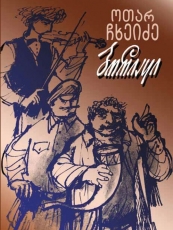FOG
‘In this novel the Bolsheviks are seen as bringers of a new order, a constant danger to the country when, in the grip of an unjust idea, they get their hands on power and violence reigns. This applies to the times that have come and is prophetic of the future, too. The novel gives an impressive portrayal of people waiting for a hero. Everyone is waiting and this interrupted motif of the search for a hero is taken up again.’
M. Jaliashvili, literary critic
EXTRACT
translated into English by Donald Rayfield
The wind died down, people calmed down, and the Korkotadzes’ apartment also calmed down and became so quiet that you’d think they had locked the door and gone away or just disappeared. Nobody now went near the telephone, although it rang and rang. Nobody answered the door any more, although the bell rang and rang, and there were periodic knocks, even banging at the door. ‘Ah, they must have gone away, or vanished,’ people thought. In actual fact they felt deeply hurt, deeply depressed and embittered. Apollon, Salome and Meri had each locked themselves away in their rooms, they were each grieving in their own way, mourning their dashed hopes in their own way. Apollon was ensconced deep in an armchair, with an abacus on his lap, calculating how much he had spent on birthdays and other special occasions, on wedding presents, on various gifts of food and drink. It amounted to quite a tidy sum, money that had been thrown down the drain: Apollo’s eyes became bloodshot and he was choking with bile. He should have cut down on everyday expenditure, he should have sold his car, for he could no longer expect a decent job, there was no high posting waiting for him, and this destitute man could not expect anything ever again. His pride had been crushed, he was now reduced to being an ordinary building worker, an ordinary canal digger. Wasn’t that enough cause for shame?! ‘Ha, ha, ha…’ Apollon couldn’t help looking up to see who was laughing, who knew, who’d been told. He’d done what he had to: put the car on sale, first the car, then… that was all the fault of Sal… He bit his tongue, instantly, even didn’t dare even think, let alone speak, a rebuke with respect to Salome; he wouldn’t have dared before, either, even less so now at this time of wrath. It was long time since he had seen, if he had ever seen, Salome so furious: they’d been through some thirty years, thirty years of many joys and many griefs… This was one more grief, one more cause for gnashing of teeth: yes, Salome really did gnash her teeth, taking such deep and rapid breaths as if she had turned into a human bellows. Apollon couldn’t speak, he couldn’t even allow himself an unspoken rebuke: so he silently, noiselessly went back into calculating on the abacus, re-doing the sums countless times, in the vain hope that he had made a mistake, that perhaps his expenses were much less, although the extravagance of Sal… — and once again he bit his tongue, with such anxiety and such rapidity that nearly bit his tongue literally. That, more or less, was Apollon’s state of mind. Then fate brought someone who would not let go of the doorbell: it rang and rang, it rang continuously: the veranda was full of the noise, so were the rooms, and everybody’s nerves. One more second and Apollon’s patience would have snapped, had someone else, whose patience had snapped, not answered the door. Apollon heard the sound of heavy footsteps. ‘Aha, that was Salome,’ thought Apollon, holding his breath and closing his eyes as he waited for something terrible. But nothing terrible happened: he could hear a calm, relaxed short conversation, and then the sound of heavy footsteps gave way to the former silence. ‘Yes, that’s what comes after a relaxed conversation,’ thought Apollon, deeply ensconced in his armchair, with one hand falling back on the abacus, while he breathed on the other hand to warm it up... (See PDF)
In case of using the information, please, indicate the source.
